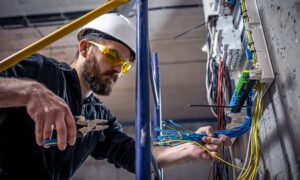Electricians play a crucial role in our modern society, ensuring that our homes, businesses, and industries have safe and reliable electrical systems. From installing new wiring to repairing faulty circuits, electricians are the unsung heroes who keep our world powered and connected.
Becoming an Electrician
Becoming an electrician requires a combination of education, training, and practical experience. While some electricians start their careers by attending trade schools or technical colleges, many enter the field through apprenticeship programs. These programs provide hands-on training under the guidance of experienced professionals, allowing apprentices to learn the ropes while earning a paycheck.
Skills Required
To excel as an electrician, one must possess a variety of skills, including strong technical aptitude and problem-solving abilities. Electricians must be able to interpret blueprints and technical diagrams, troubleshoot electrical issues, and safely handle power tools and equipment.
Types of Electricians
Electricians specialize in various areas, including residential, commercial, and industrial settings. Residential electricians focus on wiring homes and apartments, while commercial electricians work on larger buildings such as offices, stores, and restaurants. Industrial electricians, on the other hand, are tasked with maintaining and repairing electrical systems in factories and manufacturing facilities.
Job Duties
The job duties of an electrician in Huntsville AL vary depending on their specialization, but typically include installation, maintenance, and repairs. Electricians may install new electrical systems in newly constructed buildings, perform routine maintenance to ensure the safety and efficiency of existing systems, and troubleshoot and repair electrical problems as they arise.
Safety Regulations
Safety is paramount in the field of electrical work, and electricians must adhere to strict safety regulations to protect themselves and others from harm. The Occupational Safety and Health Administration (OSHA) sets forth guidelines and standards that electricians must follow to minimize the risk of accidents and injuries on the job.
Tools of the Trade
Electricians rely on a variety of tools and equipment to perform their work, from basic hand tools like screwdrivers and pliers to more advanced devices such as multimeters and circuit testers. Having the right tools for the job is essential for completing tasks safely and efficiently.
Challenges Faced
Electricians face a range of challenges in their day-to-day work, from working in confined spaces to dealing with electrical emergencies. Whether they’re installing wiring in a cramped attic or responding to a power outage in the middle of the night, electricians must be prepared to tackle whatever challenges come their way.
Career Opportunities
The demand for skilled electricians is expected to remain strong in the coming years, providing ample opportunities for those entering the field. Electricians can also pursue specialized certifications and training to advance their careers and increase their earning potential.
Costs and Pricing
The cost of hiring an electrician varies depending on factors such as the complexity of the job, the materials required, and the electrician’s level of experience. While some projects may be relatively inexpensive, others, such as rewiring an entire house or installing a new electrical panel, can be more costly.
Importance of Hiring a Professional
While DIY electrical work may seem like a cost-effective solution, it can pose serious risks to both property and personal safety. Hiring a professional electrician ensures that the job is done right the first time, reducing the likelihood of accidents, injuries, and costly repairs down the road.
Emerging Technologies
Advancements in technology are shaping the future of the electrical industry, from smart home systems to renewable energy solutions. Electricians must stay up-to-date on the latest trends and innovations to remain competitive in the ever-evolving field.
Sustainability in Electrical Work
With growing concerns about climate change and environmental sustainability, electricians are increasingly focused on green energy initiatives and energy-efficient solutions. From installing solar panels to upgrading to LED lighting, electricians play a key role in promoting a more sustainable future.
Conclusion
In conclusion, electricians are essential members of our society, responsible for ensuring that our electrical systems are safe, reliable, and efficient. From residential homes to commercial buildings to industrial facilities, electricians play a vital role in keeping the lights on and the power flowing.
FAQs
- Are electricians in high demand? Yes, electricians are in high demand, especially as infrastructure continues to grow and older systems require maintenance and upgrades.
- How long does it take to become an electrician? The length of time it takes to become an electrician varies depending on the educational path chosen, but most apprenticeship programs last between four and five years.
- What are some common electrical problems in homes? Common electrical problems in homes include faulty outlets, tripped circuit breakers, and flickering lights.
- Is DIY electrical work safe? DIY electrical work can be dangerous and is not recommended for inexperienced individuals. It’s best to leave electrical work to trained professionals.
- How can I find a reputable electrician in my area? You can find a reputable electrician by asking for recommendations from friends and family, researching online reviews, and verifying credentials and licenses.



































